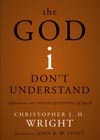Skill Builders
Article
Christopher Wright on His Book "The God I Don't Understand"
The God I Don't Understand
By Christopher J. H. Wright
Zondervan, 2008
PreachingToday.com: What is the value of trying to explore the things we don't understand about God?

Christopher J. H. Wright: When I think from the point of view of preachers who are trying to lead and feed their congregations, the value is to be honest with the Scriptures. The Scriptures themselves show us a lot of examples of people who struggled with God, who had questions for God, who didn't always understand the ways of God. We need to stand alongside biblical characters like Jeremiah, Job, and even Abraham. Even Jesus on the cross asks, "Why has God forsaken me?" So there's a perfectly biblical validity in being willing to admit our own humility, our lack of understanding of everything about God. God says, "My ways are not your ways, my thoughts are higher than your thoughts." So it's an exercise in pulpit humility that we do that.
So there's a pastoral role here?
Very much so. The way in which we preach can sometimes be disabling of the congregation. We can give the impression we've got all the answers. If we dogmatically tell a congregation exactly what to think and what all the answers are, we may unwittingly give two wrong impressions. One is that they can't and shouldn't think for themselves, and if they've got questions then there's something wrong with them. They won't feel they can raise those questions without being thought to be unfaithful. On the other hand, we can give the impression that the job of the pastor is to know all the answers, and I don't think that that's necessarily true.
We are to teach and make clear what the Scriptures say, but we've also got to say, "I sit where you sit, I'm also a child of God, I'm also in need of teaching, and I need to recognize the limits of my own understanding." From a pastoral point of view, that stance can be liberating to a congregation. It can help them say, "It's okay to wrestle, to ask questions, and our pastor will put an arm around us as we do that."
What major questions do you address in your book, and what are some of the most important things you felt God taught you as you meditated on these questions?
The book has four parts. The first is really what sparked it, which is the question of "What about suffering and evil?" When something terrible happens and we ask, "Where is the sense in that?" maybe the answer is there is no sense. The effort to make sense out of evil is in itself mistaken. What we can understand is we don't understand, and that's a good thing, because ultimately evil has no rationale. God's purpose is ultimately to destroy it. What its origin is, God seems to have chosen not to tell us, and that in itself is significant.
The next section of the book is called, "What about the Canaanites?" Many people have difficulty with, as they say it, "The God of the Old Testament." The violence and war and all of that can be an obstacle to people, a stumbling block for faith. I deal with a number of false trails on that, ways people try to minimize that or explain it all away, which don't really work. I try to say that isn't good enough and then put the issue into what I think is a more biblical perspective.
Next, as I thought about the God I don't understand, I realized that my nonunderstanding is not just about things that trouble me, but also things that are the core of my faith. And so the third section is "What about the Cross?" I don't think we will ever be able to fathom entirely the why and the what and the how of all that God accomplished on the cross of Christ, and yet it's the essence and core of our faith. One of the issues, of course, that people are struggling with at the moment is this question of penal substitution. Is that a right and good way of talking about the Cross, or is it a caricature that has been damaging to the church? So I wrestle with that a bit.
You asked what fresh insights I had while writing the book. One of them was certainly this: If we take the Cross in the light of the Old Testament Scriptures—which is the story in which it fits, because Jesus fulfills the mission of Israel—then we can see that the question of whether the Cross was an act of human evil that was suffered by God or an act of God's wrath that was suffered by God himself in the person of Christ isn't one we have to answer. The Old Testament shows us that historical actions can be both. The story of the exile with its destruction of Jerusalem by Nebuchadnezzar was simultaneously an act of human evil and an act of God's judgment. I think we can see the Cross in the light of that.
The fourth area of the book is "What about the end of the world?" There are all sorts of things that we can't possibly understand about how God is going to bring about a re-creation. What will the new creation be like? We have no means to visualize it other than through the resurrected body of Christ. I explore aspects of the return of Christ, the resurrection of the body, the last judgment, and then what the new creation tells us about how we are to live in the present.
Based on your experience writing this book, what advice do you have for preachers who design sermon series that attempt to answer common questions about God and his world? What could make such a series counterproductive? What would make it a good series?
The first thing I would say is we shouldn't always be trying to preach sermons that are answers to questions. We can end up with a problem-based, thematic preaching that never deeply engages with the text of the Bible in a systematic way. It is right from time to time that you start from the topic, from the question, and then seek to apply the Bible to it, and I'll come back to that in a moment, but there is no substitute for systematic and planned preaching of the Bible. When you take whole books or sections of books and seek to expound what the text says, what you invariably find is that then raises the questions. Out of the text arise the questions, and so you're addressing them within the framework of the Scriptures. Steady, interesting, creative, expository preaching of the Bible text will provide the nourishment that puts those questions in perspective.
My next advice would be to seek to address such questions out of the story of the whole Bible. In other words, don't just look for the best verse you can think of to answer the question. Ask what that question looks like when you put it in the light of the fundamental narrative of creation—that this is God's world we're living in—as well as the fundamental account of the fall into sin and radical evil. What does your question look like when you examine the narratives of the Old Testament and the models God gave in all those stories? What does the question look like in relation to the law that God gave Israel, the wisdom, the prophecies?
Search the Scriptures in a systematic, canonical way. Move through to the New Testament and set this issue under the light that God has become human in Christ; what has the Incarnation got to say to this? Has God lived with this problem in the human flesh of Jesus? What is the teaching of Jesus?
Of course you should then come to the Cross, as I do repeatedly in my book. If we look at these issues through the profundity of the meaning of the Cross, they often get into a better perspective. Think about your question in relation to the Resurrection and then the mission of the church and the presence of the Holy Spirit. Ultimately, what does this question look like in light of the eternal perspective of the new creation, that there will be an end to suffering and evil, and there will be a new humanity living in a new creation with the living Christ in the presence of God.
So my advice generally is, don't be content with thin Bible answers to big questions from proof text verses. Set the question in the light of the whole Scripture. When preachers do that, they are modeling to their congregation how to deal with such issues. We get into the habit of thinking through the Bible and thinking with the Bible so that our thinking in itself becomes biblical.
Calvin and other theologians warn repeatedly about not engaging in speculation beyond what God has revealed to us. At what point do you think we should stop trying to understand the God we don't understand?
That's a hard one because I don't know that there are necessarily easy to define limits unless the Scriptures tell us. It's not easy to draw boundaries, because we are curious animals, aren't we? We want to go on exploring and thinking, and I don't think that's necessarily wrong. We should search and seek as much as we can, but if we get to the point of saying, "I just cannot fathom this," it may be right to say: "Okay, well, that's because it's ultimately unfathomable." It's God we're talking about. It's beyond the reach of our understanding, so live with contentment in those areas where everything is not perfectly clear.
Christopher J. H. Wright is international director of the Langham Partnership International. He also serves as chair of the Lausanne Committee's Theology Working Group, and chair of the Theological Resource Panel of TEAR Fund. He is author of several books, including The Mission of God (IVP Academic, 2006).











